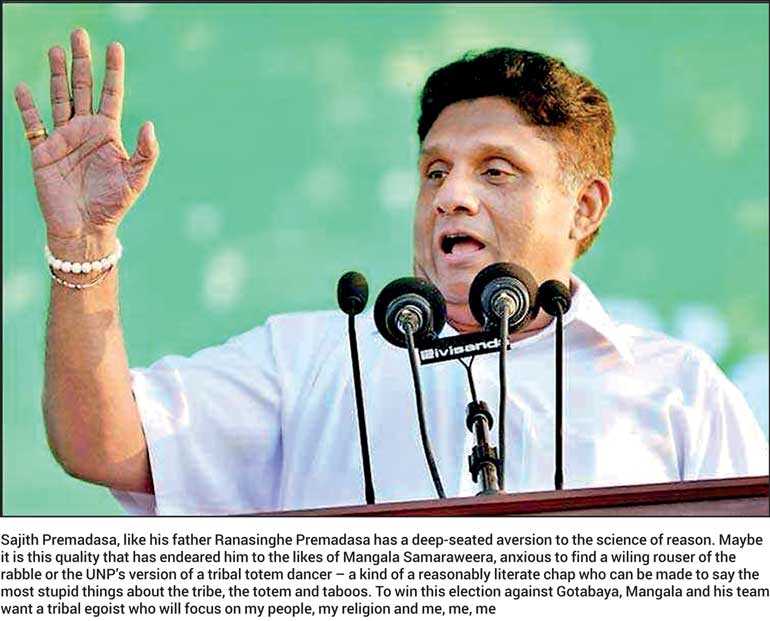Saturday Feb 14, 2026
Saturday Feb 14, 2026
Saturday, 21 September 2019 00:01 - - {{hitsCtrl.values.hits}}

 We are what time, circumstances and history has made of us. We are trapped in history. At age 77, I refuse to trap history in my mind. This essay is an obligation to history.
We are what time, circumstances and history has made of us. We are trapped in history. At age 77, I refuse to trap history in my mind. This essay is an obligation to history.
Although J.R. Jayewardene introduced ‘Executive Presidentialism’, coercive cruelty of presidentialism in the public psyche of my generation is firmly linked to the presidency of Ranasinghe Premadasa. We carry the scars.
R. Premadasa was the first to practice ‘patronal presidentialism’. Unlike his predecessor, R. Premadasa was the rank outsider to the establishment. He set down the precedents of ‘patronal presidentialism’ that his successors Chandrika and Mahinda gleefully followed. His ethos was simple. Don’t be dissuaded by people who tell you that it cannot be done.
As a directly elected president he addressed the nation from the Octagon in Kandy. The office had bestowed on him significantly more authority than other state organs. Unlike JR who drafted the constitution, Ranasinghe Premadasa had the advantage of interpreting the constitution in his own light – that of the street fighter who cut his teeth in municipal politics of Colombo. He realised that the president’s power was not confined only to such as stipulated in the constitution. The Presidency was an opportunity to build extensive patron-client relationships that covered the country. Power was no longer limited to codified law. The executive presidency with its immunity enabled him immense power to manipulate an informal hierarchical power network through which he channelled state resources to the loyal and punished his opponents.
Ranasinghe Premadasa was the first ‘patronal president’ with a charmed inner circle of a presential elite who were committed to carry out his edicts 24 x 7.
The office of President was the institutional focal point of an elite independent of the cabinet of Ministers. The patronal president decided on matters for the better or worse in consultation with his trusted aides. Parliament was an inconvenient adjunct.
Very early in the process, Sajith Premadasa was forthright in his belief that his nomination by the UNP was his birth right. He told us that as the son of Ranasinghe Premadasa, he had prepared himself for this onerous task from the day he was born.
Now we talk of shadowy excesses of an all-powerful executive running berserk with an outfit labelled the ‘Tripoli Platoon’. Citizens of my generation have an obligation to remind the current generation of the ‘Lawrence Mafia’ that functioned under the Premadasa presidency. It was truly the fountain head of extra judicial processes of taming dissent. It was that terrible mechanism of fear that compelled a group of UNP dissenters to rebel against their autocratic leader.
Sajith Premadasa has now moved one step further. He wants to perpetuate the executive presidency and the current constitutional order.
Any talk of abolishing the presidency would therefore be a negation of his manifest destiny. He has boldly, bluntly and brazenly dismissed his party’s officially declared policy committed to abolish the executive presidency.
At a press conference held at the home of Mangala Samaraweera, his new political praetorian, he insisted, quite vehemently, that no scientific study has established that the abolition of the executive presidency was either a national imperative or an objective desired by the electorate. He seems oblivious to the stringent laboratory test that demonstrated the profoundly heinous nature of executive presidentialism during the October constitutional coup.
Sajith Premadasa is committed to build 1,125 ‘stupas’ throughout the land. Now in this noble undertaking he has a solid scientific explanation for dotting the island with protuberant piles of concrete that serves no practical purpose other than appeasing the piety of the ‘wide eyed’ and ‘silly’ minded.
Sajith Premadasa like his father Ranasinghe Premadasa has a deep-seated aversion to the science of reason. Maybe it is this quality that has endeared him to the likes of Mangala Samaraweera, anxious to find a wiling rouser of the rabble or the UNP’s version of a tribal totem dancer – a kind of a reasonably literate chap who can be made to say the most stupid things about the tribe, the totem and taboos. To win this election against Gotabaya, Mangala and his team want a tribal egoist who will focus on my people, my religion and me, me, me!
.
The change from fickle politics to firm politics had a price. An executive president with absolute immunity while in office would replace the office of the prime minister subject to the whims of a parliament. Logic of market economics would override reason and equity. Darwinian law of the ‘strong’ feeding on the weak would be overarching rule. Presidential discretion would be the exception to the rule. The authority of the presidency would only exclude gender tampering – making a man a woman or vice versa! Introducing harsh structural reforms in a society that was benignly sheltered by social safety nets called for what a social theorist accurately described as arrogantly authoritarian, coercive policies of an intransigent regime. We can seep brush over our mistakes, but we cannot forget the lessons of
our mistakes
What is wrong with the presidential system?
What is wrong with the presidential system? The executive presidential system institutionally separates the legislature and the executive. There is adequate literature scientific and demonstrative to make the point that presidentialism is incompatible with representative multi-party democracy.
Let us briefly examine how we ended up with this conundrum. At the 1977 general election, the UNP under JRJ swept to office with a five sixth majority while polling only 50.7% of the overall vote.
Of all our post-independence political leaders, J.R. Jayewardene is the only leader who had tasted electoral defeat. He lost his seat in 1956. He was the quintessential machine politician. He was feared and respected as a consummate political operator.
At the ceremonial session of the newly-elected parliament, he whispered to the Leader of Opposition Amirthalingam who was seated next; “It took me 30 years to get to this seat.”
The conventional economic wisdom at the time was that poor developing countries should follow programs of import substitution. They must not import manufactured products from developed economies. Developing countries should export their primary produce and use their foreign exchange reserves for infrastructure development and enhancing their manufacturing capacity. Persistent poverty of developing countries was the result of exploitative practices of capitalist economies.
A resolute leader, JRJ jettisoned the idea of import substitution and the regulated economy.
He forced open an economy that was hermetically sealed since adopting exchange control in the fifties. An economy insulated from the world was dragged kicking, screaming into the remorseless world of the invisible hand moving the market. This was 12 years before the fall of the Berlin wall and the failure of global socialism. It was 15 years before the developed economies formed the World Trade Organisation to bring the semblance of a world order in free trade.
In introducing these systemic shifts that were seismic in their impact, J.R. Jayewardene never forgot his humiliating defeat at the polls in 1956. Just as winning the war became a unique selling proposition in the post-civil war period, winning independence was the winning formula of the ruling elite of the post-independence years.
The fickle voter had finally given him an instrument for drastic change and reform. He admired two men – Napoleon and Disraeli.
The depositary of power is always unpopular said Disraeli. He followed Napoleon’s dictum that a true master of politics was able to calculate, down to the smallest fraction, the advantages to which he may put his very faults!
Proportional representation would prevent a reversal of his far-reaching structural changes.
From fickle politics to firm politics
The change from fickle politics to firm politics had a price. An executive president with absolute immunity while in office would replace the office of the prime minister subject to the whims of a parliament. Logic of market economics would override reason and equity. Darwinian law of the ‘strong’ feeding on the weak would be overarching rule. Presidential discretion would be the exception to the rule. The authority of the presidency would only exclude gender tampering – making a man a woman or vice versa!
Introducing harsh structural reforms in a society that was benignly sheltered by social safety nets called for what a social theorist accurately described as arrogantly authoritarian, coercive policies of an intransigent regime. We can seep brush over our mistakes, but we cannot forget the lessons of our mistakes.
History is for human self-knowledge. The only clue to what we can do in the future is what we have done in the past. The value of history is that it tells us what kind of fools we were in the past.
The executive presidency caused two civil wars, one in the south and another in the north.
The Rajapaksa family did not invent impunity or disregard for the rule of law. When the then government moved a parliamentary resolution to deprive Sirimavo Bandaranaike of her civil rights, the opposition pleaded that the government await the Supreme Court determination on her writ application. The then Prime Minister Ranasinghe Premadasa put the matter to rest. “Even if the Supreme Court rejects the Report and the recommendations of the Commission, we shall not withdraw the Resolution that we are going to pass today” (Hansard Vol II – 16.10.80). The executive presidency killed democracy and undermined the rule of law on that fateful day in October 1980.